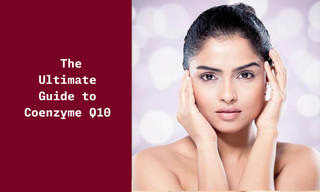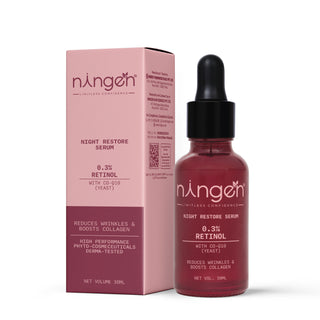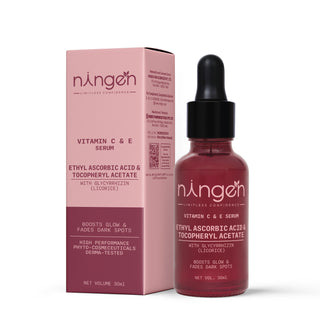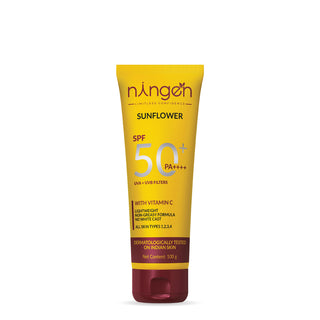Coenzyme Q10 is the spark your skin needs!
If you've ever wondered how to give your skin a boost, you're in the right place. We're here to demystify Coenzyme Q10, a special ingredient that works like magic for your skin. There is no complicated jargon, just straightforward information on how this powerhouse can make your skin happy and healthy.
Whether you're a skincare pro or a newbie, join us on this journey as we break down the secrets of Coenzyme Q10, making skincare simpler and more effective. Welcome to the ultimate destination for skincare wisdom – our blog, "The Ultimate Guide to Coenzyme Q10 for Skin."
In This Article;
- What is Coenzyme Q10?
- Coenzyme Q10 Uses
- Benefits of Coenzyme Q10 in Skincare
- Dietary Sources of Coenzyme Q10
- Understanding Oxidative Stress and its Impact on Skin Health
- Connection Between Oxidative Stress and Skin Aging
- The Powerful Antioxidant Properties of Coenzyme Q10
- How Coenzyme Q10 Acts As a Potent Antioxidant in The Body
- Wrapping Up
- TL;DR(Too Long; Didn't Read)
- Frequently Asked Questions
What is Coenzyme Q10?
Coenzyme Q10, or CoQ10 for short, is like a tiny helper in our bodies. It's a natural thing that helps make energy in our cells, acting like a power source. This little helper is also good at stopping bad things called free radicals, which can harm our cells.
Scientifically, CoQ10 is a naturally occurring compound that is found in every cell of the body.
It is a powerful antioxidant that plays a crucial role in the production of energy within the cells. CoQ10 is responsible for converting the energy from the food we eat into a form that the cells can use.
In addition to its role in energy production, CoQ10 also helps to protect cells from damage caused by free radicals. Free radicals are unstable molecules that can cause oxidative stress and damage to the cells, leading to various health problems and aging.
As we get older or if we're not feeling well, the amount of CoQ10 can go down. Some people take CoQ10 as a supplement to help keep their energy up, and it's also used in skincare products to keep our skin healthy and fresh.
In addition to its role in energy production and antioxidant activity, the benefits of Q10 also include supporting heart health, improving exercise performance, and reducing the side effects of certain medications.
CoQ10 is naturally present in small amounts in a variety of foods, including meat, fish, and whole grains. However, the levels of CoQ10 in these foods are not sufficient to provide the therapeutic benefits that are often seen with supplementation.

Coenzyme Q10 Uses
Coenzyme Q10 (CoQ10) plays a critical role in the production of energy in the form of adenosine triphosphate (ATP). Here are the primary uses and benefits of CoQ10:
- Energy Production: CoQ10 is essential for the production of ATP, which provides energy for cellular processes. It is particularly important in tissues with high energy demands, such as the heart and muscles.
- Antioxidant Protection: CoQ10 acts as a powerful antioxidant, helping to protect cells from oxidative damage caused by free radicals. This can help reduce the risk of chronic diseases associated with oxidative stress.
- Heart Health: CoQ10 is often used to support cardiovascular health. It may help improve symptoms of congestive heart failure, reduce high blood pressure, and enhance overall heart function. Some studies suggest that CoQ10 supplementation can improve the outcomes of patients with certain heart conditions.
- Migraine Prevention: CoQ10 has been shown to help reduce the frequency and severity of migraines. It is believed to improve mitochondrial function, which may be impaired in individuals who suffer from migraines.
- Improving Exercise Performance: By enhancing mitochondrial function and reducing oxidative stress, CoQ10 may improve exercise performance and reduce fatigue in both athletes and non-athletes.
- Skin Health: CoQ10 is used in skincare products for its anti-aging properties. It can help reduce the appearance of wrinkles and fine lines by promoting collagen production and protecting the skin from oxidative damage.
- Support for Statin Users: Statins, drugs used to lower cholesterol, can reduce the levels of CoQ10 in the body. Supplementing with CoQ10 can help mitigate some of the muscle-related side effects associated with statin use.
- Neurodegenerative Diseases: Some research suggests that CoQ10 may have potential benefits in treating neurodegenerative diseases such as Parkinson's and Alzheimer's disease, possibly by protecting nerve cells from damage and improving mitochondrial function.
- Fertility: CoQ10 may improve both male and female fertility. In men, it can enhance sperm quality and motility, while in women, it may improve egg quality and ovarian function.
- Diabetes Management: CoQ10 may help improve blood sugar control and reduce oxidative stress in individuals with diabetes, potentially helping to prevent complications associated with the disease.
- Immune System Support: By enhancing cellular energy production and reducing oxidative stress, CoQ10 can support the immune system, helping the body to better defend against infections and illnesses.
Benefits of Coenzyme Q10 in Skincare
Incorporating skincare enriched with Coenzyme Q10 can bring about several improvements to the skin:
- Antioxidant Protection: CoQ10 is a powerful antioxidant that helps neutralize free radicals, protecting the skin from oxidative stress caused by environmental factors like UV rays and pollution.
- Reduction in Wrinkles and Fine Lines: CoQ10 supports collagen production, a key protein that maintains skin elasticity. By boosting collagen, CoQ10 helps reduce the appearance of wrinkles and fine lines, promoting smoother skin.
- Improved Skin Firmness: With its role in supporting collagen and elastin fibers, CoQ10 contributes to enhanced skin firmness, preventing sagging and promoting a more lifted appearance.
- Cellular Energy Boost: CoQ10 is involved in cellular energy production, aiding in skin cell renewal and rejuvenation. This can result in a more vibrant and youthful complexion.
- Protection Against Sun Damage: CoQ10's antioxidant properties extend to protecting the skin from harmful UV rays, helping to prevent sun damage and maintaining a healthier skin barrier.
- Reduction in Age Spots and Uneven Skin Tone: By combating oxidative stress, CoQ10 contributes to a more even skin tone and can help reduce the development of age spots, promoting a brighter complexion.
- Enhanced Hydration: CoQ10 supports the skin's natural ability to retain moisture, leading to improved hydration levels and a softer, smoother skin texture.
- Combination with Other Ingredients: CoQ10 works synergistically with other skincare ingredients, such as vitamin C, vitamin E, and Retinol, enhancing their effectiveness and providing comprehensive skincare benefits.
- Promotion of Skin Health: Regular use of CoQ10-enriched skincare contributes to overall skin health, minimizing the impact of environmental stressors and promoting a resilient and radiant complexion.
- Anti-Inflammatory Effects: CoQ10's anti-inflammatory properties can help soothe and calm the skin, making it beneficial for individuals with sensitive or irritated skin.
Note: Read our other article to know how Retinol helps in anti-aging.
Including Coenzyme Q10 in your skincare routine can contribute to overall skin health, providing protection, rejuvenation, and a more radiant complexion.
Dietary Sources of Coenzyme Q10
Coenzyme Q10 is a vital nutrient that plays a crucial role in the body's energy production and overall health. While the body naturally produces CoQ10, it's also important to obtain this nutrient from external sources. Here are some common sources of CoQ10:
- Fatty fish: Fish like salmon, tuna, and mackerel are rich sources of CoQ10. These fish also provide essential omega-3 fatty acids, which further support heart health and overall well-being.
- Organ meats: Liver, heart, and kidney are all rich sources of CoQ10. However, it's important to consume organ meats in moderation due to their high cholesterol content.
- Nuts and seeds: Nuts and seeds, such as peanuts, sesame seeds, and pistachios, are good plant-based sources of CoQ10. They also contain healthy fats, fiber, and various other nutrients.
- Vegetable oils: Certain vegetable oils, like soybean, canola, and sunflower oil, contain significant amounts of CoQ10. These oils are also rich in vitamin E, which has antioxidant properties and helps protect the body's cells from damage.
- Broccoli, cauliflower, and spinach: These vegetables contain CoQ10, as well as other important vitamins, minerals, and antioxidants. Including them in your diet can help support overall health and well-being.
- Supplements: CoQ10 supplements are also available in the form of capsules, tablets, and soft gels. These supplements can be a convenient way to ensure you're getting enough CoQ10, especially if you have a busy lifestyle or dietary restrictions.

Incorporating these sources of CoQ10 into your diet can help ensure you're getting an adequate amount of this important nutrient. However, it's always best to consult with a healthcare professional before adding any new supplements or making significant changes to your diet. By prioritizing a balanced, nutrient-rich diet, you can support your body's natural production of CoQ10 and promote overall health and well-being.
Understanding Oxidative Stress and its Impact on Skin Health
Oxidative stress is a term that is often thrown around in discussions about skin health, but what exactly does it mean and how does it impact the skin? Simply put, oxidative stress is an imbalance between the production of free radicals and the body's ability to neutralize them. Free radicals are unstable molecules that can cause damage to cells, including skin cells, and are a byproduct of normal bodily processes as well as environmental factors such as pollution and UV radiation.
When the skin is exposed to excessive levels of free radicals, it can lead to oxidative stress, which in turn can have a damaging impact on the skin. This can manifest as visible signs of aging such as wrinkles, fine lines, and sagging skin, as well as skin conditions like acne, eczema, and psoriasis. Additionally, oxidative stress can also contribute to the development of skin cancer.
So, what can be done to combat oxidative stress and protect the skin? One of the most effective ways is to incorporate antioxidants into your skincare routine. Antioxidants are molecules that can neutralize free radicals, thus reducing the damaging effects of oxidative stress on the skin. Common antioxidants found in skincare products include vitamins C and E, green tea extract, and resveratrol.
In addition to using antioxidants topically, it's also important to support the body's natural defense against oxidative stress by leading a healthy lifestyle. This includes eating a diet rich in fruits, vegetables, and other sources of antioxidants, as well as avoiding excessive sun exposure, smoking, and other environmental toxins.
Connection Between Oxidative Stress and Skin Aging
As we get older, our skin changes and one noticeable thing is the appearance of wrinkles and lines. These changes are normal as we age, but things like sunlight and pollution can speed up this process, causing oxidative stress.
Oxidative stress happens when there's an imbalance between harmful molecules and our body's defense. This can damage skin cells, making our skin less bouncy and more prone to wrinkles. Things like too much sun, pollution, smoking, and an unhealthy diet can increase this damage, making our skin look uneven and dull.
To fight this, we can use antioxidants in our skincare, like vitamins C and E, to neutralize the harm. Eating fruits, veggies, and nuts with antioxidants helps too. Avoiding smoking and too much sun exposure also protects our skin.
Understanding how oxidative stress affects our skin lets us take steps to keep it healthy. Using antioxidants and making healthy choices can help our skin stay youthful and resilient as we age.
Note: Know about the lifestyle habits that cause skin aging. Click on the link.
The Powerful Antioxidant Properties of Coenzyme Q10
Coenzyme Q10 is a powerful antioxidant that has gained popularity in recent years for its numerous health benefits. This naturally occurring compound is found in every cell of the human body. It is essential for the production of energy and the protection of cells from damage caused by harmful free radicals.
One of the most well-known benefits of CoQ10 is its antioxidant properties. Antioxidants are substances that help protect the body from damage caused by free radicals, which are unstable molecules that can cause oxidative stress and lead to a wide range of health problems, including heart disease, cancer, and aging.
CoQ10 works by neutralizing free radicals and preventing them from causing damage to cells and tissues. This can help reduce the risk of chronic diseases and slow down the aging process. Studies have shown that CoQ10 supplementation can improve the antioxidant capacity of the body and reduce oxidative stress, leading to better overall health and a lower risk of disease.
In addition to its antioxidant properties, CoQ10 has been found to have many other health benefits. It has been shown to improve heart health by reducing the risk of heart disease and lowering blood pressure. CoQ10 also plays a key role in energy production and can help increase energy levels and reduce fatigue. Additionally, it has been found to have anti-inflammatory properties, which can help reduce inflammation and promote overall wellness.
While the body produces CoQ10 naturally, its levels can decrease with age and certain health conditions. This is why many people choose to supplement with CoQ10 to ensure they are getting enough of this important nutrient. CoQ10 supplements are available in various forms, including capsules, soft gels, and liquids, and can be found at most health food stores and pharmacies.
How Coenzyme Q10 Acts As a Potent Antioxidant in The Body
Coenzyme Q10 is a vital molecule that acts as a potent antioxidant in the body. This naturally occurring compound is found in every cell and is essential for the production of energy and the protection of cells from oxidative damage.
As an antioxidant, CoQ10 plays a crucial role in neutralizing free radicals, which are unstable molecules that can cause damage to cells and contribute to various aging-related diseases. Free radicals are byproducts of normal metabolic processes as well as exposure to environmental factors such as pollution, radiation, and tobacco smoke.
When free radicals outnumber the body's antioxidant defenses, they can cause oxidative stress, leading to cellular damage and inflammation. To counteract this, the body relies on antioxidants like CoQ10 to scavenge free radicals and prevent their harmful effects.
It is particularly effective as an antioxidant due to its ability to regenerate other antioxidants, such as vitamin E and vitamin C. This means that it can help to restore the antioxidant properties of these essential vitamins, further protecting the body from oxidative stress.
In addition to its role as an antioxidant, CoQ10 also supports mitochondrial function, which is crucial for energy production within cells. Optimizing cellular energy production indirectly helps to reduce oxidative stress and support overall cellular health.
Research has shown that CoQ10 supplementation can provide significant antioxidant protection, particularly in individuals with certain health conditions, such as cardiovascular disease, diabetes, and age-related degenerative disorders. Furthermore, CoQ10 levels in the body naturally decline with age, making supplementation a valuable strategy for maintaining optimal antioxidant defenses.
Note: Know about high-performance, plant-derived CoQ10-rich anti-aging serum that is safe for all types of skin.
Wrapping Up
We've navigated the fascinating world of Coenzyme Q10, uncovering its transformative potential for your skin. From its role as a powerful antioxidant to its ability to boost collagen production and combat signs of aging, CoQ10 stands as a skincare hero. As you embark on your journey to healthier, more radiant skin, consider incorporating it into your routine.
Whether you're aiming for smoother skin, a youthful glow, or protection against oxidative stress, CoQ10 has proven its worth. This guide has equipped you with the knowledge to make informed choices for your skincare regimen. Embrace the power of Coenzyme Q10 and let your skin flourish with vitality.
Here's to a future of radiant, confident beauty!
Explore our recommended product selection for Coenzyme Q10 and related products in the section below.
Quick view
Coenzyme Q10, or CoQ10, is an essential compound found naturally in every cell of the body, where it plays a vital role in energy production and acts as a potent antioxidant. It helps protect cells from damage caused by free radicals, thereby reducing oxidative stress and lowering the risk of chronic diseases. CoQ10 supports heart health, enhances skin vitality by reducing wrinkles and promoting collagen production, and offers benefits for conditions like migraines, neurodegenerative diseases, and diabetes management. Found in foods like fatty fish and nuts, CoQ10 can also be supplemented to maintain adequate levels and support overall health, making it a versatile and beneficial nutrient for skincare and beyond.
Frequently Asked Questions
What is Coenzyme Q10 (CoQ10)?
CoQ10, is a naturally occurring antioxidant that plays a crucial role in energy production within cells.
How does CoQ10 benefit the skin?
CoQ10 has antioxidant properties that help neutralize free radicals, reducing oxidative stress. It also supports collagen production, promoting skin elasticity and reducing the appearance of wrinkles.
Is CoQ10 suitable for all skin types?
Yes, CoQ10 is generally well-tolerated by various skin types and can be beneficial for normal, dry, sensitive, and aging skin.
Can CoQ10 be used with other skincare ingredients?
CoQ10 is compatible with many other skincare ingredients. It can complement the effects of antioxidants like vitamin C and enhance the overall effectiveness of your skincare routine.
How long does it take to see results with CoQ10?
Results can vary, but with consistent use, many people notice improvements in skin texture and elasticity within a few weeks.
Are there any side effects of using CoQ10 on the skin?
CoQ10 is generally safe, and side effects are rare. However, it's advisable to perform a patch test before incorporating new products into your routine.
Can CoQ10 help with anti-aging?
Yes, CoQ10's antioxidant properties and its role in collagen production make it beneficial for reducing signs of aging, such as fine lines and wrinkles.
How can I add CoQ10 to my skincare routine?
Look for skincare products that contain CoQ10, such as serums or moisturizers. Follow the product instructions for the best results.
Is there a recommended concentration of CoQ10 in skincare products?
Effective concentrations typically range from 1% to 3% in skincare formulations, but the ideal concentration can vary based on individual preferences and skin needs.
Can CoQ10 be used during the day and night?
Yes, CoQ10 is versatile and can be used in both daytime and nighttime skincare routines. Incorporate it into your routine based on your preferences and the product's instructions.










